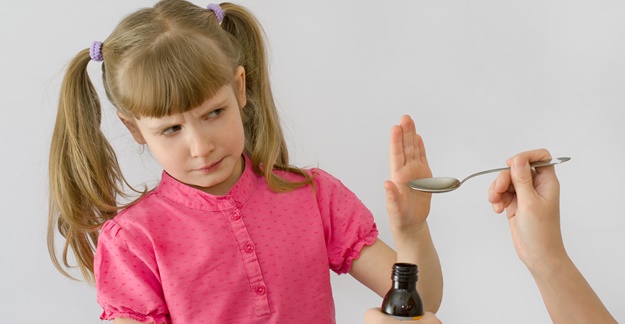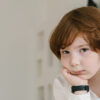I swallowed so many doses of over-the-counter (OTC) cold medication when I was a child. “Cough medicine” was my mother’s go-to remedy for colds. At the first cough or sneeze, she’d pull the bottles from the top kitchen shelf and carefully pour the viscous liquid onto a spoon, which she carefully guided into my open mouth. By the time I was a teenager, I was pouring and dosing my cold medicine independently.
What I didn’t understand until years later – until my first child was born – was the helpless, desperate feeling a parent experiences when their child is sick. Like my mom before me, I stocked a shelf in my kitchen with two types of fever-reducing medicines and a variety of OTC decongestants and cough medicines so I could quickly jump into action when my son fell ill.
When he got sick, I squirted numerous doses of acetaminophen, ibuprofen and decongestant into his tiny mouth.
My oldest son was in elementary school when the American Academy of Pediatrics and the FDA sounded an alarm. OTC medications were sending children to the hospital; some children even died as a result of side effects or inadvertent overdoses. In 2008, the FDA issued a public health advisory that warned parents not to give OTC cold medicines to children under the age of two due to the potential for “serious and life-threatening side effects.”
In 2014, the agency revised their recommendation, stating that OTC cough and cold medication should not be given to children under age four. Current research suggests that the risks of OTC cold medicines outweigh the benefits for children ages six and under, and pediatricians say that many well-intentioned parents are unnecessarily medicating feverish children.
“Parents are clearly just trying to help their children, but they’re getting bad information from marketing and elsewhere – including, sometimes, from our parents,” says Kristin Bencik-Boudreau, DO, a pediatrician associated with Children’s Hospital of Wisconsin.
Here’s what the scientific evidence has to say about how to best treat coughs, colds and fevers in children:
Most Fevers Don’t Need Meds, They Need Comfort
Contrary to popular belief, a fever cannot cause brain damage, and a fever will not continue rising unchecked if medication is not given to bring the temperature back down. A fever is simply a sign that the body is fighting infection.
“A fever is not a bad thing,” says Jennifer Shu, MD, FAAP, co-author of Heading Home with Your Newborn. “In fact, it can be a good sign that the immune system is kicking in.”
Very occasionally some children experience convulsions, or a febrile seizure, when they have a high fever. Febrile seizures can look scary, but they’re not dangerous. Most only last a few minutes and they don’t cause any long-term health problems.
If your feverish child is older than two months, try giving him a lukewarm sponge bath instead of reaching for medication. The cool water will “let some of the heat evaporate from their skin so they’ll feel better,” Dr. Shu says.
Pour your child a cold beverage too; sipping a cool drink will help prevent dehydration, which can make kids feel lousy. If these measures fail to help your child feel better, go ahead and administer an over-the-counter fever reducer such as Tylenol (acetaminophen) or Advil (ibuprofen). Your pharmacist or healthcare provider can help you determine the proper dose, based on your child’s weight. A child with a cold should be allowed to rest, drink plenty of fluids, and be kept away from other children to keep from spreading the cold (good luck with that if you have more than one child).
A fever in a child younger than two months of age is a medical emergency – not because the fever itself is inherently harmful, but because it indicates a potential infection and young babies’ have immature immune systems. So, if your newborn baby has a rectal temperature of 100.4 or higher, notify your healthcare provider immediately.
“Strong bacterial infections are rare in newborns, but if a baby were to have one, it could be super-serious,” Dr. Shu explains. “You want to get down to the bottom of it and discover the reason for the fever.”
By the time a child is three months old, you can probably handle her fevers at home. However, Dr. Shu urges parents to err on the side of caution and call their pediatrician if the child is younger than six months. She also advises parents to “treat the baby, not the thermometer.”
“A baby who looks like a million bucks and has a high temperature is less concerning than a baby who looks really sick and has a normal temperature,” Dr. Shu says. “You don’t have to treat a fever unless your child seems really uncomfortable.”
Cold Medicines Don’t Help – And Can Hurt – Children
A quick trip through the cold and flu aisle at your local pharmacy makes one thing clear: OTC medications are expensive. What’s less obvious is the most important fact: Those same medications are more likely to hurt your child than help him.
“The studies are so clear-cut on this: There is no benefit to any of these cough and cold medicines. They don’t improve symptoms. They don’t decrease the duration of illness,” Dr. Bencik-Boudreau says. “Why give your child something that does absolutely nothing?”
In fact, the cough and cold medicines marketed to families were never tested in children, Dr. Bencik-Boudreau says. But these medications can affect a child’s breathing, heart rate and blood pressure, even when given at recommended doses.
“We now know that the side effects of these medicines aren’t worth any of the potential benefits,” Dr. Shu says. Safer, more effective treatments include rest, fluids and exposure to steam via a humidifier or shower. You can use a bulb syringe to relieve an infant’s nasal congestion. Older children can use saline nasal spray. Medicated chest rub can also help.
For coughs in children older than one year, try honey. “There have been head-to-head studies comparing honey to cough suppressants, and honey worked just as well or better, without the side effects,” Dr. Shu says. Never give honey to a child under a year old as it could lead to a condition known as infant botulism resulting from bacteria spores in the honey.
When your child has a cold or fever, steer away from pharmaceuticals and focus on proven, low-cost home remedies instead.







